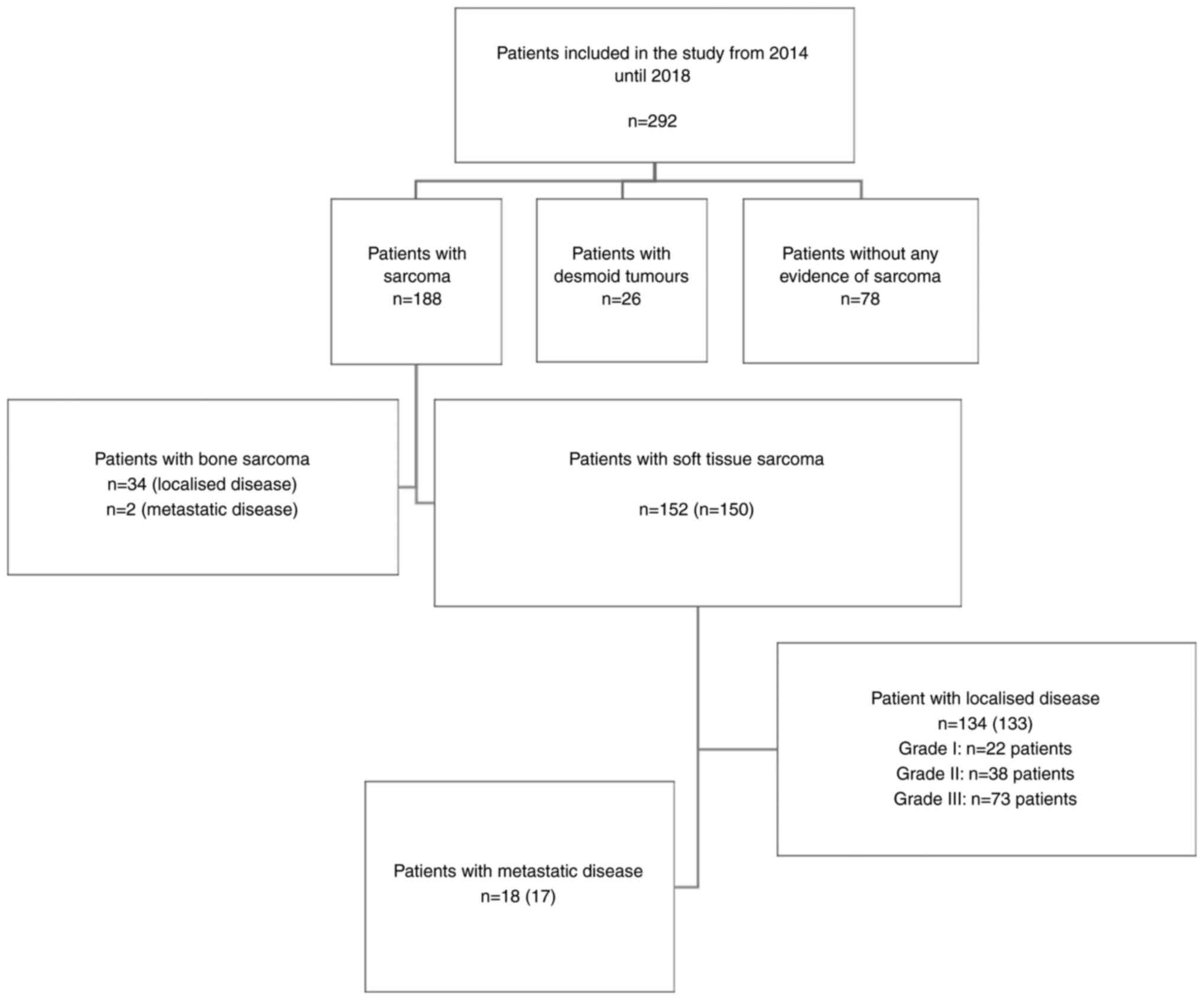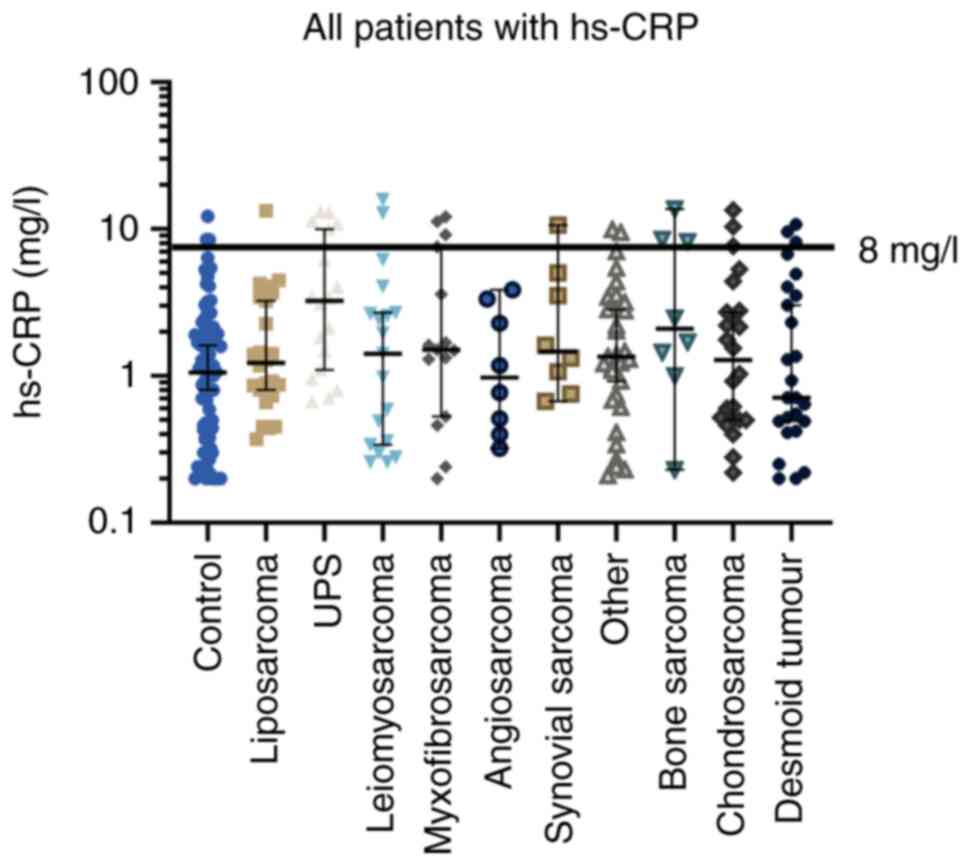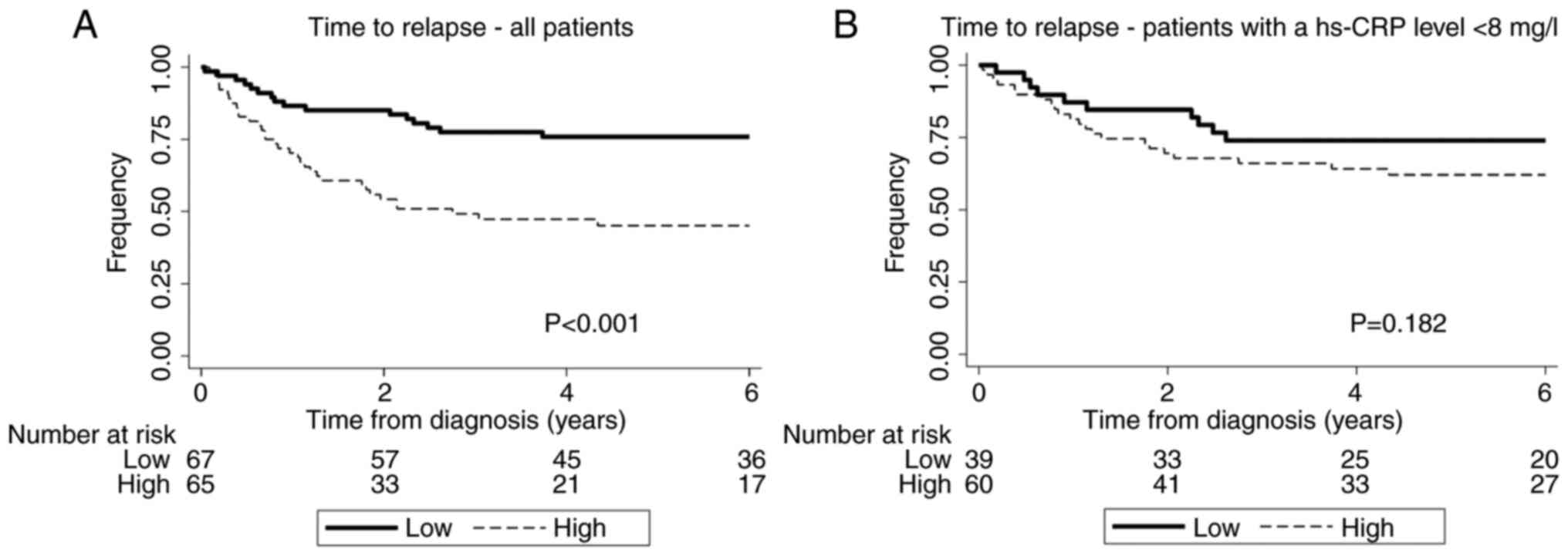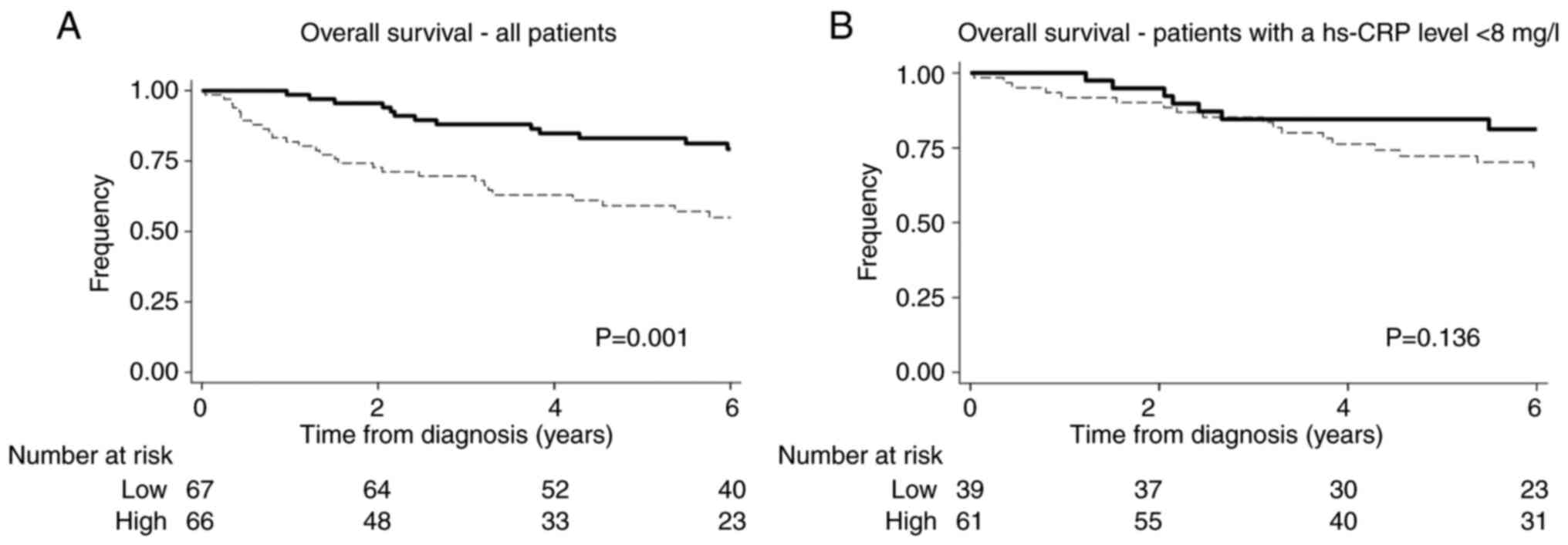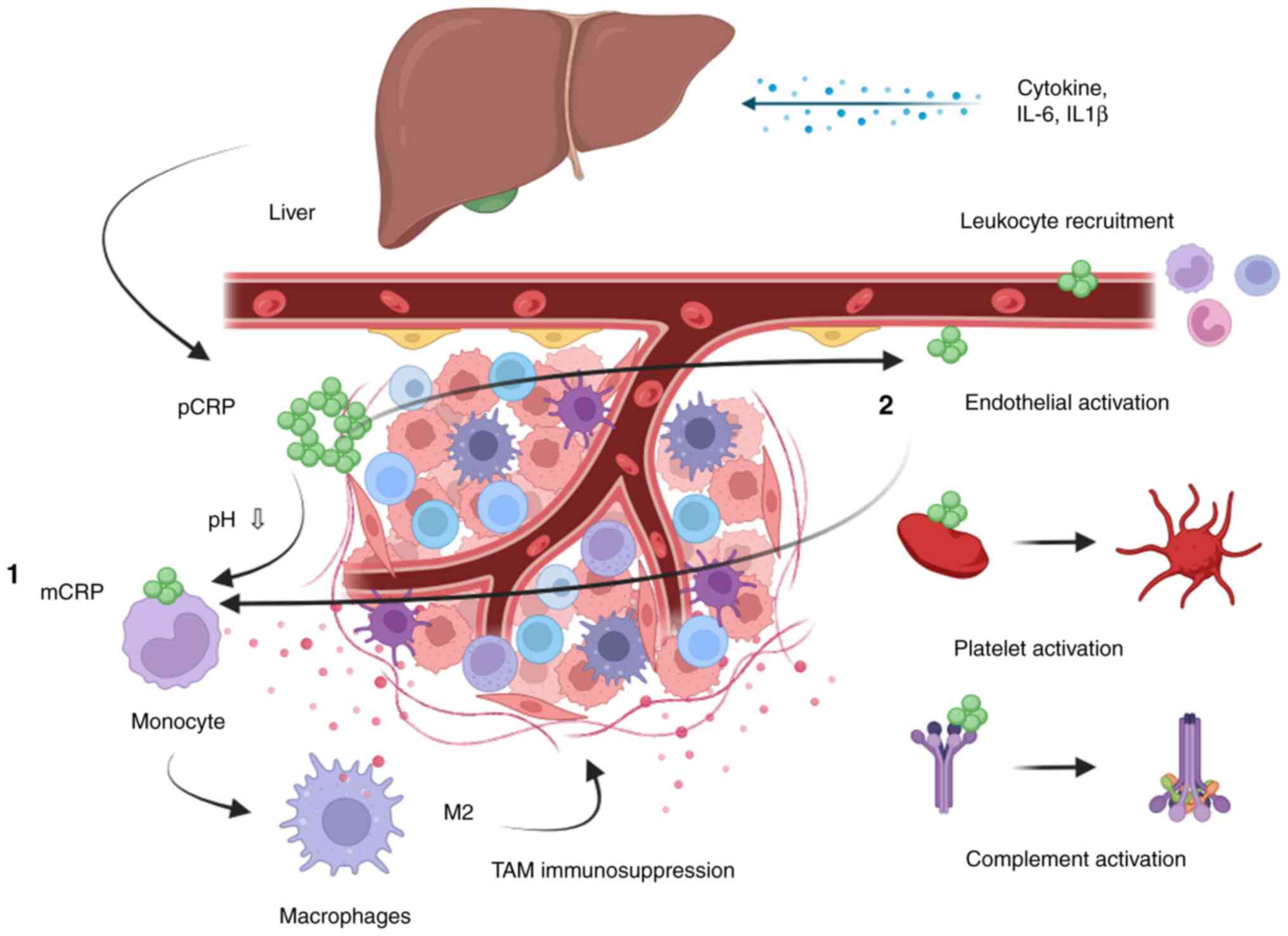|
1
|
Schwartzberg L, Korytowsky B, Penrod JR,
Zhang Y, Le TK, Batenchuk C and Krug L: Real-world clinical impact
of immune checkpoint inhibitors in patients with
advanced/metastatic non-small cell lung cancer after platinum
chemotherapy. Clin Lung Cancer. 20:287–296.e4. 2019. View Article : Google Scholar : PubMed/NCBI
|
|
2
|
Li J and Gu J: Efficacy and safety of PD-1
inhibitors for treating advanced melanoma: A systematic review and
meta-analysis. Immunotherapy. 10:1293–1302. 2018. View Article : Google Scholar : PubMed/NCBI
|
|
3
|
Saerens M, Brusselaers N, Rottey S,
Decruyenaere A, Creytens D and Lapeire L: Immune checkpoint
inhibitors in treatment of soft-tissue sarcoma: A systematic review
and meta-analysis. Eur J Cancer. 152:165–182. 2021. View Article : Google Scholar : PubMed/NCBI
|
|
4
|
Kolb-Bachofen V: A review on the
biological properties of C-reactive protein. Immunobiology.
183:133–145. 1991. View Article : Google Scholar : PubMed/NCBI
|
|
5
|
Clyne B and Olshaker JS: The C-reactive
protein. J Emerg Med. 17:1019–1025. 1999. View Article : Google Scholar : PubMed/NCBI
|
|
6
|
Calabró P, Willerson JT and Yeh ETH:
Inflammatory cytokines stimulated C-reactive protein production by
human coronary artery smooth muscle cells. Circulation.
108:1930–1932. 2003. View Article : Google Scholar : PubMed/NCBI
|
|
7
|
Guo F, Liu JT, Wang CJ and Pang XM:
Pravastatin inhibits C-reactive protein generation induced by
fibrinogen, fibrin and FDP in isolated rat vascular smooth muscle
cells. Inflamm Res. 61:127–134. 2012. View Article : Google Scholar : PubMed/NCBI
|
|
8
|
Xing XQ, Duan S, Wu XW, Gan Y, Zhao SP,
Chen P and Wu SJ: Atorvastatin reduces lipopolysaccharide-induced
expression of C-reactive protein in human lung epithelial cells.
Mol Med Rep. 4:753–757. 2011.PubMed/NCBI
|
|
9
|
Peyrin-Biroulet L, Gonzalez F, Dubuquoy L,
Rousseaux C, Dubuquoy C, Decourcelle C, Saudemont A, Tachon M,
Béclin E, Odou MF, et al: Mesenteric fat as a source of C reactive
protein and as a target for bacterial translocation in Crohn's
disease. Gut. 61:78–85. 2012. View Article : Google Scholar : PubMed/NCBI
|
|
10
|
Li M, Liu JT, Pang XM, Han CJ and Mao JJ:
Epigallocatechin-3-gallate inhibits angiotensin II and
interleukin-6-induced C-reactive protein production in macrophages.
Pharmacol Rep. 64:912–918. 2012. View Article : Google Scholar : PubMed/NCBI
|
|
11
|
Banait T, Wanjari A, Danade V, Banait S
and Jain J: Role of high-sensitivity C-reactive protein (Hs-CRP) in
non-communicable diseases: A review. Cureus.
14:e302252022.PubMed/NCBI
|
|
12
|
Du Clos TW: Function of C-reactive
protein. Ann Med. 32:274–278. 2000. View Article : Google Scholar : PubMed/NCBI
|
|
13
|
Yoshida T, Ichikawa J, Giuroiu I, Laino
AS, Hao Y, Krogsgaard M, Vassallo M, Woods DM, Stephen Hodi F and
Weber J: C reactive protein impairs adaptive immunity in immune
cells of patients with melanoma. J Immunother Cancer.
8:e0002342020. View Article : Google Scholar : PubMed/NCBI
|
|
14
|
Nakamura T, Katagiri H, Shido Y, Hamada S,
Yamada K, Nagano A, Yamada S, Tsukushi S, Ishimura D, Matsumine A,
et al: Analysis of factors for predicting survival in soft-tissue
sarcoma with metastatic disease at initial presentation. Anticancer
Res. 37:3137–1341. 2017.PubMed/NCBI
|
|
15
|
Aggerholm-Pedersen N, Maretty-Kongstad K,
Keller J and Safwat A: Serum biomarkers as prognostic factors for
metastatic sarcoma. Clin Oncol (R Coll Radiol). 31:242–249. 2019.
View Article : Google Scholar : PubMed/NCBI
|
|
16
|
Nakamura T, Matsumine A, Matsubara T,
Asanuma K, Uchida A and Sudo A: Clinical significance of
pretreatment serum C-reactive protein level in soft tissue sarcoma.
Cancer. 118:1055–1061. 2012. View Article : Google Scholar : PubMed/NCBI
|
|
17
|
Maretty-Kongstad K, Aggerholm-Pedersen N,
Keller J and Safwat A: A validated prognostic biomarker score for
adult patients with nonmetastatic soft tissue sarcomas of the trunk
and extremities. Transl Oncol. 10:942–948. 2017. View Article : Google Scholar : PubMed/NCBI
|
|
18
|
Aggerholm-Pedersen N, Maretty-Kongstad K,
Keller J, Baerentzen S and Safwat A: The prognostic value of serum
biomarkers in localized bone sarcoma. Transl Oncol. 9:322–328.
2016. View Article : Google Scholar : PubMed/NCBI
|
|
19
|
Funovics PT, Edelhauser G, Funovics MA,
Laux C, Berzaczy D, Kubista B, Kotz RI and Dominkus M:
Pre-operative serum C-reactive protein as independent prognostic
factor for survival but not infection in patients with high-grade
osteosarcoma. Int Orthop. 35:1529–1536. 2011. View Article : Google Scholar : PubMed/NCBI
|
|
20
|
Kandelouei T, Abbasifard M, Imani D,
Aslani S, Razi B, Fasihi M, Shafiekhani S, Mohammadi K,
Jamialahmadi T, Reiner Ž and Sahebkar A: Effect of statins on serum
level of hs-CRP and CRP in patients with cardiovascular diseases: A
systematic review and meta-analysis of randomized controlled
trials. Mediators Inflamm. 2022:87323602022. View Article : Google Scholar : PubMed/NCBI
|
|
21
|
Ghule A, Kamble TK, Talwar D, Kumar S,
Acharya S, Wanjari A, Gaidhane SA and Agrawal S: Association of
serum high sensitivity C-reactive protein with pre-diabetes in
rural population: A two-year cross-sectional study. Cureus.
13:e190882021.PubMed/NCBI
|
|
22
|
Nakamura T, Matsumine A, Iino T, Matsubara
T, Asanuma K, Uchida A and Sudo A: Role of high-sensitivity
C-reactive protein in the differentiation of benign and malignant
soft tissue tumors. Anticancer Res. 34:933–936. 2014.PubMed/NCBI
|
|
23
|
Aggerholm-Pedersen N, Friis HN,
Baad-Hansen T, Møller HJ and Sandfeld-Paulsen B: Macrophage
biomarkers sCD163 and sSIRPα in serum predict mortality in sarcoma
patients. Cancers (Basel). 15:15442023. View Article : Google Scholar : PubMed/NCBI
|
|
24
|
Unal I: Defining an optimal cut-point
value in ROC analysis: An alternative approach. Comput Math Methods
Med. 2017:37626512017. View Article : Google Scholar : PubMed/NCBI
|
|
25
|
Lee SA, Kwon SO, Song M, Choi JY, Shin A,
Shu XO, Zheng W, Lee JK and Kang D: The association of serum
high-sensitivity C-reactive protein level with the risk of
site-specific cancer mortality: The health examinees (HEXA) study
cohort. Am J Epidemiol. 191:2002–2013. 2022. View Article : Google Scholar : PubMed/NCBI
|
|
26
|
Cho HJ, Song S, Kim Z, Youn HJ, Cho J, Min
JW, Kim YS, Choi SW and Lee JE: Associations of body mass index and
weight change with circulating levels of high-sensitivity
C-reactive protein, proinflammatory cytokines, and adiponectin
among breast cancer survivors. Asia Pac J Clin Oncol. 19:113–125.
2023. View Article : Google Scholar : PubMed/NCBI
|
|
27
|
Siozopoulou V, Marcq E, Jacobs J,
Zwaenepoel K, Hermans C, Brauns J, Pauwels S, Huysentruyt C,
Lammens M, Somville J, et al: Desmoid tumors display a strong
immune infiltration at the tumor margins and no PD-L1-driven immune
suppression. Cancer Immunol Immunother. 68:1573–1583. 2019.
View Article : Google Scholar : PubMed/NCBI
|
|
28
|
Aggarwal BB, Shishodia S, Sandur SK,
Pandey MK and Sethi G: Inflammation and cancer: how hot is the
link? Biochem Pharmacol. 72:1605–1621. 2006. View Article : Google Scholar : PubMed/NCBI
|
|
29
|
Coussens LM and Werb Z: Inflammation and
cancer. Nature. 420:860–868. 2002. View Article : Google Scholar : PubMed/NCBI
|
|
30
|
Marjon KD, Marnell LL, Mold C and Du Clos
TW: Macrophages activated by C-reactive protein through Fc gamma RI
transfer suppression of immune thrombocytopenia. J Immunol.
182:1397–1403. 2009. View Article : Google Scholar : PubMed/NCBI
|
|
31
|
Fujiwara T, Healey J, Ogura K, Yoshida A,
Kondo H, Hata T, Kure M, Tazawa H, Nakata E, Kunisada T, et al:
Role of tumor-associated macrophages in sarcomas. Cancers (Basel).
13:10862021. View Article : Google Scholar : PubMed/NCBI
|
|
32
|
Wang Y, Li Z, Huang Z, Yu X, Zheng L and
Xu J: C-reactive protein is an indicator of the immunosuppressive
microenvironment fostered by myeloid cells in hepatocellular
carcinoma. Front Oncol. 11:7748232022. View Article : Google Scholar : PubMed/NCBI
|
|
33
|
McFadyen JD, Kiefer J, Braig D,
Loseff-Silver J, Potempa LA, Eisenhardt SU and Peter K:
Dissociation of C-reactive protein localizes and amplifies
inflammation: Evidence for a direct biological role of C-reactive
protein and its conformational changes. Front Immunol. 9:13512018.
View Article : Google Scholar : PubMed/NCBI
|















